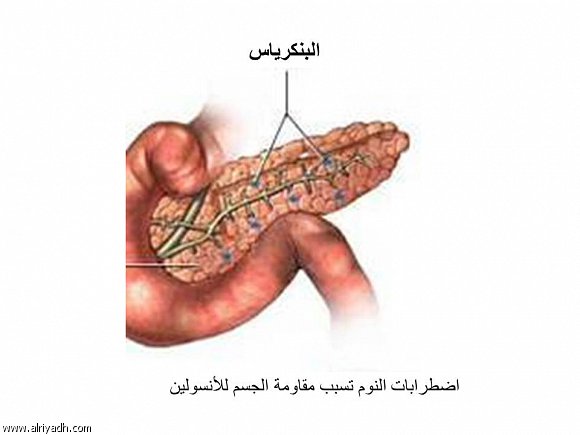قلة النوم لها تأثيرها السيئ في التركيز والمزاج والتحصيل العلمي وزيادة الوزن
السهر قد يزيد من احتمال الإصابة بمرض السكري

يُوصى بأن يتم فحص السكر لدى كل من يعانون اضطراب التنفس أثناء النوم
النوم وظيفة مهمة للجسم تؤدي إلى المحافظة على صحة وعمل أعضاء الجسم المختلفة. والابحاث الحديثة تظهر ارتباطا وثيقا بين مرض البول السكري أحد أكثر الأمراض شيوعا في مجتمعنا وبين اضطرابات النوم المختلفة. وسنحاول في هذه العجالة استعراض الأبحاث التي درست العلاقة بين بعض اضطرابات النوم ومرض البول السكري.
أ. توقف التنفس اثناء النوم:
وجد العلماء في أكثر من بحث علمي علاقة بين اضطرابات التنفس أثناء النوم والتي ينتج عنها الشخير وتوقف التنفس أثناء النوم وبين الإشارات الأولية لمرض السكري؛ حيث إن توقف التنفس أثناء النوم والشخير قد يزيدان من مقاومة الخلايا للأنسولين مما ينتج عنه ارتفاع مستوى السكر في الدم وصعوبة السيطرة عليه. وقد لاحظ باحثون من فرنسا من خلال متابعة مجموعة من الرجال المصابين بتوقف التنفس أثناء النوم، أنهم أكثر عرضة للإصابة بالأعراض المبكرة لمرض السكري مقارنة بمجموعة مماثلة من غير المصابين بالسكري. وقد تم فحص 700 رجل اشتبه بإصابتهم باضطرابات التنفس أثناء النوم، وتم اختبار دمهم قبل وبعد جرعة من الجلوكوز لمعرفة مدى كفاءة تعامل أجسامهم مع السكر. وقد أظهرت النتائج أن نصف من يعانون من اضطراب التنفس ظهرت لديهم إشارات أيضًا على خلل في بعض الوظائف الحيوية التي لها علاقة بمرض السكري. من جهة أخرى أظهرت دراسة أجريت في السويد أن نسبة الإصابة بتوقف التنفس أثناء النوم عند مرضى السكري هي ضعف نسبتها في مجموعة مماثلة من الأصحاء. لذلك يُوصى بأن يتم فحص السكر لدى كل من يعانون اضطراب التنفس أثناء النوم. ب. نقص عدد ساعات النوم:
أظهرت الأبحاث الحديثة أن نقص عدد ساعات النوم في اليوم والليلة بسبب السهر أو أسباب أخرى وهي مشكلة من مشكلات المدنية الحديثة يعانيها الكثير من المجتمعات ومنها مجتمعنا السعودي قد يؤثر في نظام الجسم المسؤول عن تنظيم مستوى السكر في الدم ويزيد من احتمالات الإصابة بمرض السكري من النوع الثاني. فقد أظهرت دراسة مخبرية نشرت في مجلة لانست أن إنقاص عدد ساعات النوم إلى أربع ساعات في اليوم لمدة خمسة أيام أدى إلى اختلال بنسبة 40 في المئة في قدرة الجسم على تعديل مستوى السكر، كما نتج منه زيادة مقاومة الجسم للأنسولين بنسبة 30 في المئة. وفي دراسة أخرى على مجموعة من المتطوعين الذين ناموا لمدة خمس ساعات في اليوم خلال يومين وتم إجراء بعض القياسات ثم سمح لهم بالنوم لمدة عشر ساعات يوميًا على مدار يومين ثم أعيدت نفس القياسات، وجد الباحثون أن قصر مدة النوم على خمس ساعات في اليوم زاد من مستوى السكر في الدم في الصباح وأثر في مستوى هرمون الأنسولين، في حين أن النوم لمدة عشر ساعات لم يؤثر سلبًا في السكر في الدم. كما أظهرت دراسات أخرى أجريت على أعداد كبيرة من الناس خارج المختبر أن نقص عدد ساعات النوم لأي سبب يزيد من احتمال الإصابة بالنوع الثاني من السكري. وفي دراسة أخرى نشرت في سبتمبر 2006 في مجلة حوليات الطب الباطني وجد الباحثون أن نقص عدد ساعات النوم يؤثر سلبًا في مستوى التحكم في السكر في الدم على المدى الطويل مما قد يزيد من احتمال حدوث مضاعفات مرض السكري، وأوصى الباحثون بضرورة التنبه إلى نظام النوم عند المرضى الذين يصعب السيطرة على مستوى السكر لديهم. دراسة حديثة أخرى قام بها باحثون من جامعة شيكاغو ونشرت في مجلة حوليات الطب الباطني، أظهرت وجود تغيرات في عمليات الأيض في خلايا الجسم عند نقص ساعات النوم. درس الباحثون 7 متطوعين على مرحلتين، في المرحلة الأولى، سمحوا لهم بالنوم لمدة 4.5 ساعات فقط يوميا لمدة اربعة ايام وفي المرحلة الثانية من الدراسة سمحوا لهم بالنوم 8.5 ساعات يوميا وفي كلا المرحلتين تناول المتطوعون نفس كمية السعرات الحرارية وقاموا بنفس الجهد اليومي. وقد أخذ الباحثون عينة من الخلايا الدهنية من المتطوعين في نهاية كل مرحلة. أظهر تحليل الخلايا أن نقص النوم تسبب في تغيرات تشبه التغيرات عند مرضى السكر حيث زادت مقاومة الخلايا الدهنية للأنسولين بنسبة 30% وهو ما يسبب الإصابة بمرض البول السكري من النوع الثاني. نتائج هذه الدراسة تكمل التصور العلمي الذي يربط نقص النوم بمرض السكري. كما أن تأثير نقص النوم على قابلية الجسم للإصابة بمرض السكري تبدا في سن مبكرة. فقد أظهرت دراسة حديثة ومهمة نشرت في مجلة (Diabetes Care) درس خلالها الباحثون نوم 62 مراهقا مصابين بالسمنة، وقاموا بقياس الكثير من مؤشرات مرض السكر مثل مستوى السكر في الدم بعد تناول وجبة سكرية وكذلك مستوى الأنسولين. وقد وجد الباحثون علاقة قوية بين نقص عدد ساعات النوم وبعض المؤشرات التي تدل على اختلال مستوى السكر في الدم. كما وجد الباحثون أن نقص مرحلة النوم العميق أثرت كذلك على قدرة الجسم على حفظ مستوى وتوازن للسكر في الجسم واستمر هذا التأثير بعد التحكم في كثير من العوامل مثل وزن المشارك وجنسه ووجود اضطرابات في التنفس أثناء النوم. هذه الدراسة تضيف معلومات مهمة لما توصل له العلماء سابقا. حيث أن الدراسات السابقة أجريت على البالغين، أما هذه الدراسة فلأول مرة تُجرى على مراهقين في مرحلة النمو وتظهر أهمية النوم الكافي للوقاية من مرض السكر.

تأثيره السيئ في التركيز والمزاج والتحصيل العلمي وزيادة الوزن
ت. اضطرابات الساعة البيولوجية:
أظهرت ابحث نشرت خلال الأعوام الماضية أن الذين يعملون شفتات ليلية بصورة مستمرة هم أكثر عرضة للإصابة بمرض السكري وأمراض القلب مما جعل العلماء يعتقدون بوجود علاقة بين الساعة البيولوجية ومرض السكري. بحث جديد نشر في مجلة Nature ,Genetics قام به فريق بحثي أوروبي كرس هذا الاعتقاد. من المعلوم أن هرمون الميلاتونين هو المسئول عن تنظيم الساعة البيولوجية في الجسم والتغير اليومي في حرارة الجسم وتنظيم وقت النوم. لذلك درس الباحثون الجين المسئول عن هذا الهرمون ويسمى MT2 على 7632 شخصاً ووجدوا أن وجود تحولات (تغيرات أساسية في المادة الوراثية) في الجين زادت من خطر الإصابة بمرض السكري. حيث إن وجود هذه التحولات جعل المستقبلات غير قادرة على الاستجابة لهرمون الميلاتونين. ومن المعلوم مسبقاً أن هرمون الميلاتونين يؤثر على إفراز هرمون الأنسولين المسؤول عن تنظيم مستوى الجلوكوز في الدم. لذلك يعتقد الباحثون أن اضطرابات الساعة البيولوجية وإفراز هرمون الميلاتونين قد تؤثر على مستوى السكر في الدم.

الشخير قد يزيد من مقاومة الخلايا للأنسولين
مما سبق يتبين لنا أهمية الحصول على نوم كافٍ، وهو أمر معروف لدى البعض، وقد تعرضنا له سابقًا بسبب تأثيره السيئ في التركيز والمزاج والتحصيل العلمي وزيادة الوزن، ولكننا اليوم استعرضنا ضررًا جديدًا للسهر وقلة النوم وهو ازدياد احتمال الإصابة بمرض السكري. أسأل الله الكريم أن يحفظكم من كل مكروه.

اضطرابات الساعة البيولوجية وإفراز هرمون الميلاتونين قد تؤثر على مستوى السكر
والتقرير بالللغه الانجليزيه
Ensure that may increase the risk of diabetes
Lack of sleep has a bad effect on focus and mood and attainment and weight gain
Ensure that may increase the risk of diabetes

It is recommended that sugar is checked at all who suffer sleep disorder
Sleep function is important for the body to maintain health and the work of the members of the body. And recent research appear intimately linked with diabetes, one of the most common diseases in our society and among the various sleep disorders. We will try in this quick review of research that examined the relationship between certain sleep disorders and diabetes.
N. Sleep apnea:
Scientists found in more scientific research relationship between sleep disorders and resulting in snoring and sleep apnea, among the initial signs of diabetes, as sleep apnea and snoring may increase resistance of the cells to insulin, resulting in high blood sugar level and difficult to control. Researchers have observed from France by tracking a group of men with sleep apnea, they are more susceptible to early symptoms of diabetes compared to a similar group of non-living with diabetes. 700 have been examined a man suspected to have sleep disorders, and their blood was tested before and after a dose of glucose to see how efficiently treated their bodies with sugar. The results showed that half of those suffering from breathing disorder appeared with references to bug in some vital functions related to diabetes. On the other hand, a study in Sweden showed that the incidence of sleep apnea in diabetes is twice in a similar group of healthy people. It is therefore recommended that sugar is checked with all who suffer sleep disorder. B. The decrease in the number of hours of sleep:
Recent research has shown that the decrease in the number of hours sleep at day and night because of that or other reasons, are modern civil problem experienced by many societies, including the Saudi society may affect the body system responsible for regulating blood sugar and increases the risk of type II diabetes. The laboratory study published in the journal Lancet that decrease the number of hours sleep to four hours per day for five days led to disruption by 40 percent in the body's ability to adjust the level of sugar, as a result, increase the body's resistance to insulin by 30 percent. In another study, a group of volunteers who slept for five hours a day in two days and make some measurements and then allowed to sleep for 10 hours a day over two days and then returned the same measurements, the researchers found that the short duration of sleep to five hours a day increased blood sugar level in the morning and the impact on the level of the hormone insulin, while sleep for ten hours did not adversely affect blood sugar. Other studies have also shown to large numbers of people outside the laboratory that lack the number of sleeping hours, for any reason, increases the risk of type 2 diabetes. In another study published in September 2006 in the journal Annals of internal medicine found that lack of sleep hours adversely affects the level of blood sugar control in the long run, which may increase the risk of diabetes complications, the researchers recommended the need to pay attention to sleep in patients who are difficult to control their sugar level. A recent study by researchers from the University of Chicago and published in the journal Annals of internal medicine, showed changes in metabolic processes in the body's cells when lack of sleeping hours. Researchers studied 7 volunteers in two phases, the first phase, allowed to sleep for only 4.5 hours per day for four days and in the second phase of the study allowed to sleep 8 hours a day in both phases the volunteers the same amount of calories and the same daily effort. The researchers took samples of fat cells from volunteers at the end of each phase. Cell analysis showed that lack of sleep caused changes like changes in diabetic patients with resistant fat cells to insulin by 30% and is the cause of diabetes mellitus type II. The results of this study complements the scientific visualization linking lack of sleep of diabetes. The impact of lack of sleep to susceptible body to diabetes begins at an early age. A recent study has shown and published in the journal (Diabetes Care) in which researchers examined sleep 62 a teenager suffering from obesity, and they measure a lot of indicators of diabetes such as blood sugar level after eating a sugar and insulin level. Researchers have found a strong link between lack of sleep and hours of some indicators of impaired blood sugar level. The researchers also found that the lack of a deep sleep also affected the ability of the body to maintain the level and balance of sugar in the body and this effect persists after control many factors such as the weight and sex and sleep disorders. This study adds important information to his former scientists found. Since previous studies conducted on adults, as this study for the first time performed on teenagers in the growth stage and show the importance of adequate sleep to prevent diabetes.

Bad effect on focus and mood and attainment and weight gain
T. Disorders of biological clock:
Show search posted during the past years the working shaftat the night are more prone to diabetes and heart disease, scientists believe the existence of a relationship between the biological clock and diabetes. New research published in the journal Nature Genetics, the European research team devoted to this belief. It is well known that the hormone melatonin is responsible for regulating the body's clock and daily change in body temperature and sleep time. So researchers studied the gene responsible for this hormone, called MT2 on 7608 people and found that the presence of mutations (changes in the genetic material) in the gene increased the risk of diabetes. Where the presence of these transformations to make receptors is able to respond to the hormone melatonin. It is known in advance that the hormone melatonin affects secretion of insulin hormone responsible for regulating the level of glucose in the blood. So researchers believe that time troubles and secretion the hormone melatonin may affect your blood sugar level.

Snoring may increase resistance of the cells to insulin
The foregoing shows us the importance of getting enough sleep, and is known to some, it has been previously due to its poor focus and mood and attainment and overweight, but today we reviewed the new damage to ensure that lack of sleep and increased risk of diabetes. May God bless you all that hated it.

Disorders and circadian hormone melatonin may affect the level of sugar






